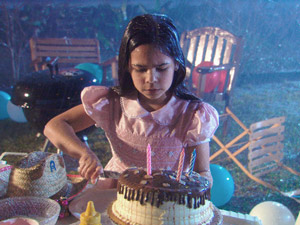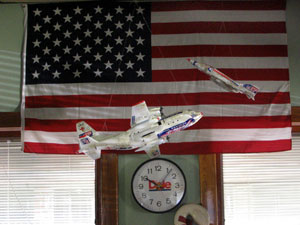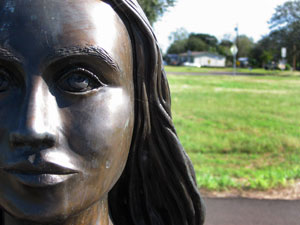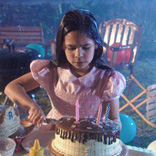This is Part Two of the adventures of Los Angeles photographers Grant Munford and Darrin Little, as they drive through the highways of TX.
Austin:
This state is dripping with history, with travel markers, courthouses, old presidios and state parks sprinkled generously all over the travel atlas. Case in point: Along Highway 183 about two hours north of Kingsville, the driver finds Goliad (remember the Alamo, remember Goliad!). Wikipedia relates:
'In 1829 , the name of the village of La Bahía was changed to Goliad, an anagram of Hidalgo (omitting the silent initial 'H'), in honor of the patriot priest Miguel Hidalgo , the father of Mexico ‘s independence .'
'On October 9 , 1835 , a group of Texians attacked the presidio, defeated the Mexican garrison and took control of the fort. The first declaration of independence of the Republic of Texas was signed here on December 20 , 1835 .'
'On Palm Sunday, March 27 , 1836 , during the Texas Revolution , the Goliad massacre occurred here when General Antonio López de Santa Anna ordered the Mexican army to execute Colonel James Fannin and 341 of his men, who surrendered after the Battle of Coleto.'
'Goliad was the birthplace of the famous Mexican General Ignacio Zaragoza .'
'On May 18 , 1902 , a devastating tornado struck Goliad, killing 114 persons. It is tied for the deadliest tornado in Texas history and the 10th deadliest in the United States.'
But I didn't care. My thoughts were in my stomach. Lisa had mentioned a barbeque place in Gonzales that about two hours ago when we left Kingsville, and I figured we had another half hour to go before we'd be eating. The restaurant there is called Gonzales Food Mart, and it's fucking killer. The smell that hits you when you get out of the car in front of the place tells you it's the real deal. You can't fake the smell of real barbeque (and, of course, the taste). When we got there, we sat in the back where the TV was playing the first Hellraiser movie, which somehow was the perfect digestive aid for the ribs, sausage, beans and corn. Remember Gonzales!
I went to school here at The University of Texas from 1987 to 1990. Driving into town made me instantly melancholic and anxious and giddy and everything else associated with homecoming. I unconsciously pulled out my 'life achievement' tape measure, put the start of it at present day in Los Angeles and pulled it all the way back to my undergraduate days in Austin, to those drugs and friends and girls and half-baked ideas about what the world was to me. It's almost like some Twilight Zone episode where you cross over into a parallel universe and are confronted with yourself, but not yourself, and you are delirious with excitement and horror simultaneously. In the next three or four days here, I looked forward to remembering/reliving this part of myself in a city that today does not remember me. I'm simply a different person and this is a different city. As William S. Burroughs stated in an interview concerning historical novels, 'You can't get there from here.'
Dallas:
I've got most of a bottle of wine in me now, doing laundry at the illustrious Studio 6 in Dallas on the outskirts of Highland Park — like, loads of money neighborhood. A couple of days before Halloween, I was in Austin at Lisa Germany's house (the writer for this coffee table book I'm working on). There I met Lawrence McFarland, a professor in the UT art department, only I had avoided him when I was a student there. You know, like I majored in art, but sort of hated the art students and professors. That horrible ironic routine. But my point here is that my favorite professor at UT, Charlie Guerrero, is dead, as Lawrence informed me. I finished serving my dinner plate and then proceeded to cry all over it for 10 minutes underneath the pre-Halloween party chatter of the other guests. Charlie helped me in ways he did not understand, and now I cannot tell him, so I will tell you that what I am now, what my pictures are now, would have been shit without Charlie. I was lucky enough in my college days at UT to have one of 'those professors' who turns you on, who turns you up full volume. Charlie wasn't about art or truth or immortality. He was about sharing his knowledge, his successful business savvy and his technical understanding of the medium.
Anecdote: My last critique session in the spring of 1990. I had done a series of portraits for my final project, and Charlie just looked at them for a horribly silent long time and said, 'I don't know what to say about these…. I think you should take them upstairs.' 'Upstairs' meant Lawrence McFarland and Mark Goodman, the 'art' photographers teaching in the department at the time. I didn't take them upstairs, as I was still fighting what was already happening to me, namely, that I was becoming an artist quite without the conscious will to do so. I fought it as long as I could, which is ironic since I got a degree in art studio, but you know that's how a lot of people are, how a lot of everything is. I came on this road trip partly because I knew we'd stop in Austin and I'd get the chance to remember Charlie, and then I'd call him and tell him to check out my website. I'd thank him for helping me become what I am now. Maybe that's too much credit for him, but he's just died and I'm sentimental, and honestly, he did make a huge difference.
Running toward El Paso. Spent the night in Ft. Stockton, a town you look forward to leaving. A lot of Texas is like this: flat piece of earth turning and unfolding in quiet desolation toward a lonely truck stop, hick diner or sparsely populated 'Fort' town (Texas independence from Mexico, the Indians and the early Spanish missions). IHOP and Motel 6 stand at full attention in these 'just passing through' towns, happy to see you neither come nor go, but certainly do not stay and marry my daughter to enlarge our stagnating gene pool. But that is perhaps too harsh a judgment for what Gene Wilder in Blazing Saddles qualified as 'the common clay of the land.' The irony is that even though I'm from Houston and have extended family in a small town you never heard of, I have experienced a large degree of culture shock throughout the road trip, even as I simultaneously have experienced culture solidarity (we're all Texans).
We spent a week in Dallas, holed up in a Studio 6 (Motel 6 for travelers who require weekly or monthly accommodations) and doing the 30 million dollar private residence tour in the nicest (duh!) areas of Dallas and Ft. Worth (the 'fort' thing again!). I cannot give you juicy details about the uber-wealthy and their private art collections, as there is a news blackout per the book publisher's and individual owners' requests, but I can tell you that kind of money gets vulgar real fast. You wake up in a Motel 6 cubicle and drive 15 or 20 minutes to somebody's 30 million dollar (I'm guessing) estate, live that privileged day as a photo assistant/voyeur, and then drive back to your Motel 6 cubicle and settle in with cheap Chinese food and bad cable TV. Dialectical materialism via Karl Marx and Che Guevara. I heard a story that when Fidel Castro took power, he was invited to NYC to meet politicians and reporters. The PR people reserved a room for him at the Plaza Hotel, but he did an about-face in the lobby and instead went up to Harlem, where he checked into a fleabag motel and proceeded to cook a chicken in his room while reporters and photographers laughed/balked. Probably half propaganda, that story, but you get the drift.
There's too much to tell the reader in this little blog. Let me just summarize generally: Texas is a lot of lonely open highway, punctuated with small hick towns. You've seen the lonely highways and hick towns in many movies. This reporter finds the highways look better in person, while the hick towns (and the people) look better in film.
And to summarize specifically: There was this country yodeler from either Mississippi or Alabama (as with most legends, the details get murky) named Jimmie Rogers. He got famous in Tennessee, but his tuberculosis forced him and his wife to move to a dryer climate, namely Kerrville, Texas, where he built a $25,000 two-story brick mansion that he called his 'Blue Yodeler's Paradise.' I'd heard of this guy, though not specifically the music. You'd think that the town of Kerrville, surely not known for anything else, would have bought this now-infamous Rogers house and wrapped it in historical society plaques and red ropes to commemorate not only Jimmie Rogers, the musician, but Jimmie Rogers, the tourist attraction. But as Grant and I discovered when we stopped in Kerrville, it was hard just finding the damn house. We went through four or five people at the Kerrville Chamber of Commerce until we found the all-knowing town elder (every town or city has one) who confirmed that the house still exists but is privately owned, and as such does not support visitors. We opened our free tourist map of the town and encouraged her to circle the exact location, so as to facilitate an 'unofficial' visit. Fifteen minutes later we were parking across the street from the 'Blue Yodeler's Paradise.' There were three or four cars parked in the long driveway and some high school football team banner planted in the front yard, but no indication whatsoever as to the fame of the home. Grant and I stood discreetly across the street and wondered if it would be appropriate to knock on the door, maybe get a peek inside? As we traded the pros and cons of making contact, the owner or a family member pulled into the driveway, got out and shot us a glance that said, 'I see you and I know why you're looking at my house from across the street. Don't even fucking think about coming over here and asking me any goddamn questions about Jimmie Rogers.
This is my house now, private property for private people like me and my private family, who wish to live PRIVATELY.' Question: What moron would buy the former home of Jimmie Rogers and not think that thousands of people each year wouldn't drive by and knock on the door? For that matter, what moron(s) over at Kerrville City Hall decided that it would be better if the town didn't buy the Rogers house, but instead allow it to go up for private sale?
The publisher of this upcoming coffee table book on Texas architecture is Harry Abrams. Look for it sometime in 2008 (ahh, the sweet pace of the publishing industry). I guarantee you the photographs are worth the wait.
Text by Darrin Little and photos by Grant Mudford.








